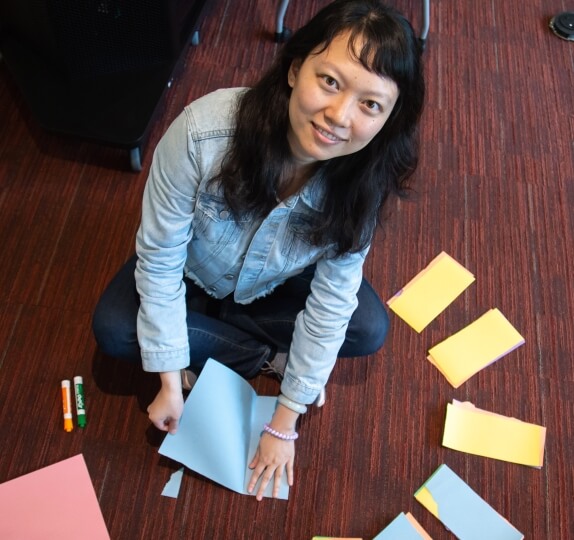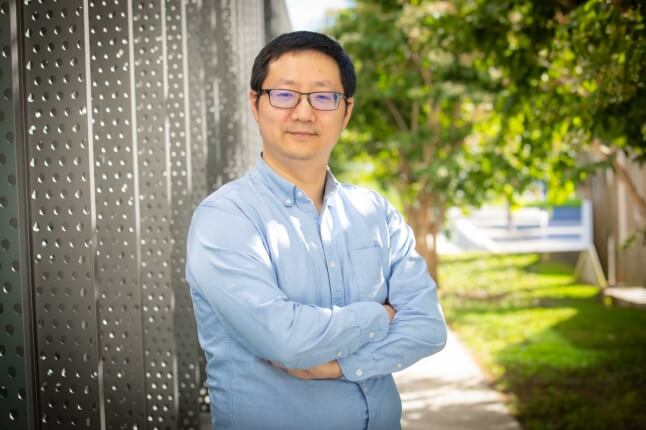News
Xueshan Zhang, S.M. '14
Xueshan Zhang grew up reading the news in her native China. As she got older, she noticed she was reading the same news over and over again.
Zhang wanted to be more than a passive reader of bad news. While pursuing her master’s in computational science and engineering from the Harvard John A. Paulson School of Engineering (SEAS), she came across a student organization called “SEED for Social Innovation,” which provided a space for Chinese overseas students and young non-profit professionals working in her home country to gather and discuss ideas and innovative practices to seed a better China.
Zhang was hooked.
“I never expected to hear people telling their important life stories on why they chose to do their current work to someone they had just met three days ago,”said Zhang, S.M. '14. “Some stories were heartbreaking, some inspiring. People were doing completely different things – sex education for kids, teaching left-behind children, testing river water quality. They started to shed tears and hug each other like friends who’d not met for a long time. I sat there, having no idea how all this happened. This completely drew me to SEED.”
Within a year, SEED – which stands for “social responsibility, empathy, empowerment and dedication” – had become a critical part of Zhang’s life. She directed SEED’s flagship event, a two-week development camp at the time held in Cambridge. In 2017, as SEED’s president, she transited SEED from a Harvard student volunteer organization to an independent non-profit in China and moved back there. Later in the year, she became SEED’s first full-time employee. Even after stepping away from the SEED board in 2023, she remains a member of its community.
“As a SEED member, I can say that SEED aims to empower Chinese young people who are interested in social issues and want to do something with their own hands,” she said. “When young people start to do something and find that they can create change, they no longer feel powerless or helpless. When a person sees a group of like-minded peers doing similar work, they no longer feel lonely. If they start to talk about their findings, learnings, challenges and solutions, they share collective experience and wisdom, which pushes them to go even further.”
It was Zhang’s father who encouraged her to study math because its rigors would make anything else she wanted to study easier. After earning her B.S. in probability and statistics at Peking University, Zhang decided to go abroad to experience different cultures and broader ways of living. She got her first master’s degree in mathematics and statistics at the University of Waterloo in Canada, then joined the inaugural cohort of computational science and engineering students at SEAS.
“After Waterloo, I wanted to study more in computer science,” she said. “I liked my two coding classes in college, and wanted to go to the US. Furthermore, Harvard offered me a chance to meet talented people in different fields and explore a world bigger than math and coding. It was very similar to Peking University in this way. I’d always enjoyed being on college campuses like that, so I came.”
Zhang’s research projects at SEAS included determining an optimal route to visit Disney World and a language model that can score a movie by analyzing emotions in written reviews of it. After getting her degree, Zhang spent the next two years working for Microsoft by day and helping build SEED by night.
“Training in CSE gave me the confidence and guts to work well at Microsoft,” she said. “We delivered posters and websites as final projects at SEAS. That made it very easy to present myself and my work in job interviews. At Microsoft, I did several open workshops and poster presentations in conferences in the Seattle campus, for fellow-data-scientists, customers, and even sales.”
After leaving Microsoft in 2016, Zhang spent a year as a research fellow at the Harvard Ash Center for Democratic Governance and Innovation. That fellowship proved critical, as it convinced her to move back to China in 2017 so she could better understand the non-profit entrepreneurship happening there.
“In Ash, we tried to collect philanthropy donation data in China through web crawling and email questionnaires,” she said. “Both were difficult. I needed to build one-to-one, face-to-face relationships to know how things really work.”
Through SEED, Zhang joined and helped accelerate a community undertaking a wide range of youth-led projects. Specific initiatives included teaching poetry to children living in rural Chinese mountain villages, improving information access during natural disaster relief, expanded access to speech therapists for children in need of rehabilitation, and greater technology accessibility for the visually impaired.
“When we talk about social issues, we pay attention to things,” she said. “However, it is people creating all of the dreams, drives, agendas, losses, failures, and hopes. This is why SEED’s work always starts from people and focuses on people. We ask where their concerns and hopes come from. We see if they learn from their mistakes. We feel if they care about the people they work with and work for more than their own ego or fame. We build trust and connection with them, believing this is the foundation of all their subsequent work.”
Now an independent researcher, Zhang primarily works with non-profits and philanthropic organizations to assess their impact in the community, analyze areas of society still in need of philanthropic intervention, and develop young employees who want to innovate. She continues to carry the experiences she’s had helping develop the social participation of Chinese young people.
“I am glad that I took the job as a president of SEED and brought it into an independent organization in China,” she said. “It was the hard way, yet it gave the organization, the team and I myself a chance to be closer to the community we want to support. If we hadn’t done this, we would have never learned how it really is to run a newborn non-profit in China as a young person. Such experience supported how we designed our projects, and shaped our insights.”
Topics: Applied Computation, Alumni, Computational Science & Engineering, Entrepreneurship
Cutting-edge science delivered direct to your inbox.
Join the Harvard SEAS mailing list.
Press Contact
Matt Goisman | mgoisman@g.harvard.edu



